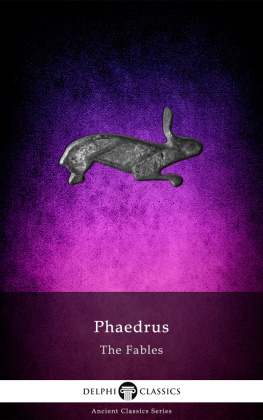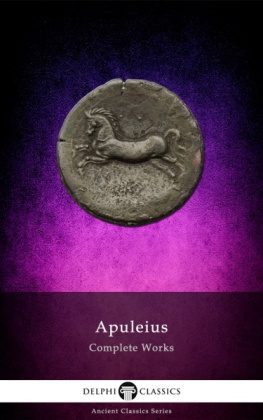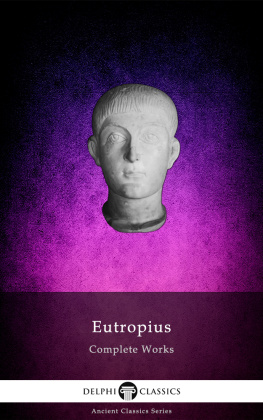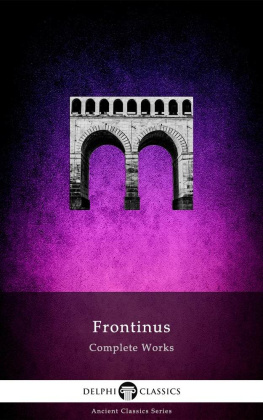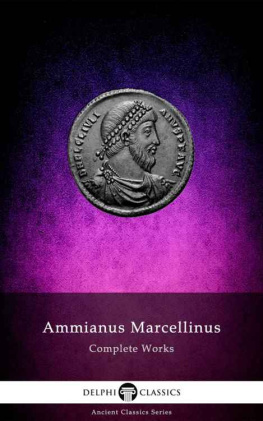
The Fables of
PHAEDRUS
(fl. 1 st century AD)

Contents

Delphi Classics 2020
Version 1

Browse Ancient Classics







The Complete Works of
GAIUS JULIUS PHAEDRUS

By Delphi Classics, 2020
COPYRIGHT
The Fables of Phaedrus

First published in the United Kingdom in 2020 by Delphi Classics.
Delphi Classics, 2020.
All rights reserved. No part of this publication may be reproduced, stored in a retrieval system, or transmitted, in any form or by any means, without the prior permission in writing of the publisher, nor be otherwise circulated in any form other than that in which it is published.
ISBN: 978 1 91348 735 5
Delphi Classics
is an imprint of
Delphi Publishing Ltd
Hastings, East Sussex
United Kingdom
Contact: sales@delphiclassics.com

www.delphiclassics.com
The Translations

Ruins at Pydna, Pieria, Macedon Phaedrus assumed birthplace
The Fables: Prose Translation

Translated by Henry Thomas Riley, 1887
Flourishing in the first century AD, Gaius Julius Phaedrus was a Roman fabulist and the first recorded versifier of Aesops fables into Latin. Very few facts are known about Phaedrus and there was little mention of his work during late antiquity. It was not until the discovery of a few imperfect manuscripts during the Renaissance that his importance as a teller of fables emerged. His fables survive in five books, accompanied with various prologues and epilogues.
Traditionally, the Aesopica is a collection of fables credited to Aesop, a slave and storyteller believed to have lived in ancient Greece between 620 and 564 BC. Of diverse origins, the didactic tales associated with his name have descended to modern times through a number of sources and continue to be reinterpreted in different verbal registers.
Regarding Phaedrus life, scholars have deduced from autobiographical hints in the extant fables a few facts. He was born in Macedonia, probably in Pydna, in c. 15 BC and he came to Rome as a slave and was freed by Augustus. He probably served as a teacher for a time, before his first book of his poems appeared in the reign of Tiberius. However, envious competitors interpreted the morals of his fables as critical of the current regime and he was tried by Sejanus, the Emperors powerful official. In the prologue of the third book, Phaedrus pleads with a Eutychus to intercede on his behalf, which appears to have been successful. He survived these unstable times into old age, possibly serving under Claudius. Phaedrus went on to complete two more books of fables and died towards the middle of the first century AD. Still, these few statements are regarded by some scholars as dubious.
The first writer of fables in Latin, retelling the Aesopic tales in a loose iambic metre, Phaedrus remains an important writer in the history of world literature. The dates of composition and publication are unknown, though Seneca the Younger, writing between 41 and 43 AD, recommends in a letter to Claudius freedman Polybius that he turn his hand to Latinising Aesop, a task hitherto not attempted by Roman genius, implying that nothing was known of Phaedrus work at that time. By the mid-80s Martial was imitating Phaedrus and mentions his mischievous humour (improbi jocos Phaedri). The next reference to Phaedrus is a homage by his fellow fabulist Avianus, written much later in the fourth century.
A ninth century manuscript of Phaedrus fables was only discovered in France towards the end of the sixteenth century and published in 1596 by Pierre Pithou as Fabularum Aesopiarum libri quinque . It was followed by two more editions before centurys end. Close to the beginning of the eighteenth century, a manuscript of the fifteenth century bishop Niccol Perotti was discovered at Parma, containing sixty-four fables of Phaedrus, of which thirty were previously unknown. These new fables were first published in 1808, and their versions were afterwards superseded by the discovery of a much better preserved manuscript of Perotti, held in the Vatican Library and published in 1831. Scholars realised that Phaedrus work had also served as the basis for mediaeval fable collections that survived under the name of Romulus.
Phaedrus fables are composed in a lively terse and simple Latin verse, with some elaborate style, and serving as excellent models for students of the language. They were not written only to amuse and teach, but also to provide compelling satirical comments on the turbulent social and political life of first century Rome.

A 1745 engraving of Phaedrus

Hellenistic statue thought to depict Aesop, Art Collection of Villa Albani, Rome
CONTENTS

The first edition title page of this translation
PREFACE.

I N THE T RANSLATION of Phdrus, the Critical Edition by Orellius, 1831, has been used, and in the sopian Fables, the text of the Parisian Edition of Gail, 1826. The Notes will, it is believed, be found to embody the little that is known of the contemporary history of the Author.
H. T. R.
BOOK I.
Next page
